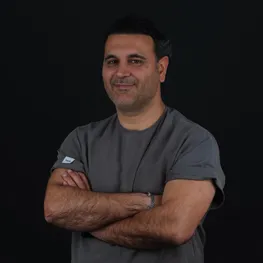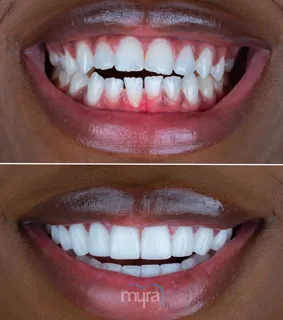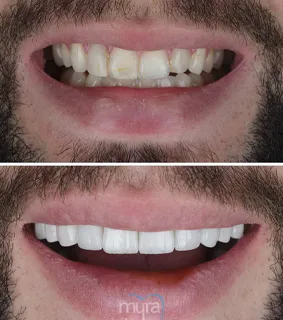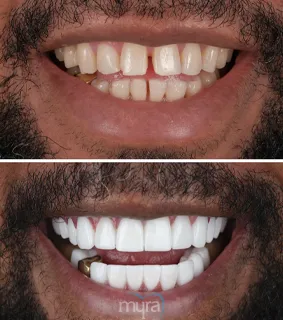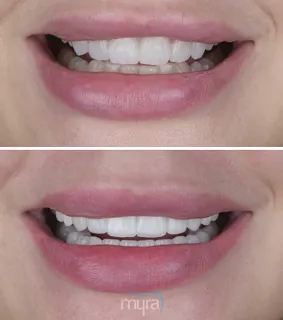A dental implant is a surgical component composed of titanium that is put into the jawbone to replace a missing tooth or teeth. A dental implant functions as an artificial root, offering a solid base on which a crown, bridge, or denture is firmly fastened. The implant combines with the surrounding bone tissue through a process known as osseointegration, resulting in a strong and durable tooth repair that closely resembles the appearance and function of the native tooth.
There are a few things to consider before receiving a dental implant in Turkey. First, researching and selecting a reputable dental clinic or implantologist with a track record of successful implant surgeries must be the highest priority. Second, patients must consider the dental implant cost, which is frequently less expensive in Turkey than in many Western nations, without sacrificing quality. Third, make sure the dental clinic uses top-notch supplies and complies with international dental standards. Fourth, consider the travel and lodging logistics since dental implant therapy requires several visits over a few months.
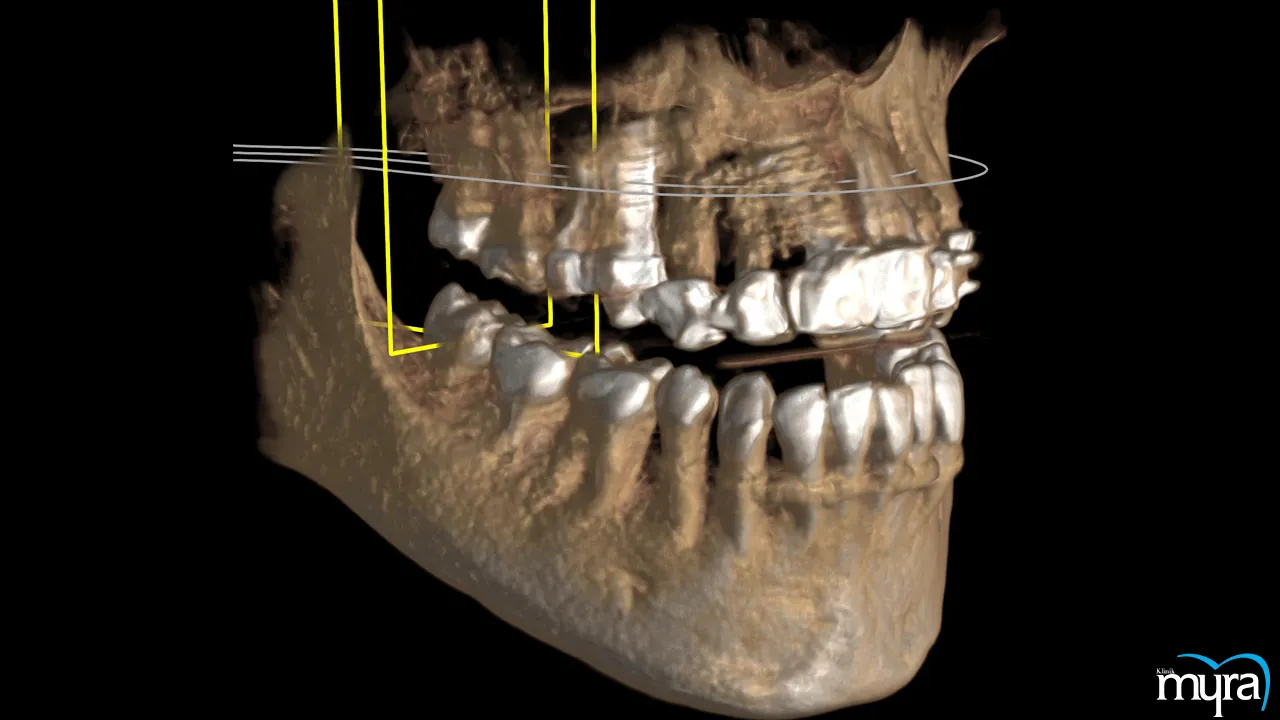
Dental implants have many benefits, including restoring chewing and speech function, reducing jaw bone loss, and offering a long-lasting, natural-looking replacement for lost teeth. Dental implants do not necessitate the modification of surrounding healthy teeth, as do standard bridges. Dental implant operations are intrusive and take time to recuperate. Some drawbacks include the risk of negative consequences such as infection or implant failure, the overall expense, and the requirement for a surgical procedure. Patients considering dental implants must carefully assess these pros and cons and how to restore teeth enamel naturally.
Veneers and dental implants are two separate treatments with different applications. Implants restore missing teeth by surgically attaching a prosthetic tooth to the jawbone, providing a long-term and functional alternative. Veneers are tiny porcelain or composite resin shells that are attached to the front of natural teeth to enhance their appearance. Veneers don't replace missing teeth. They are usually utilised for cosmetic purposes to address problems such as discolouration, chipping, or misalignment. The exact dental issue and the intended result determine whether implants or veneers are better. The dentist recommends a composite restoration for a patient's teeth as part of a comprehensive teeth restoration plan.
Dentures and dental implants are choices for replacing missing teeth, although they are very different in structure and operation. Implants offer a fixed, long-lasting solution and are surgically inserted into the jawbone. They provide comfort while eating and speaking, stability, and durability. Dentures are removable attached prosthetic appliances that rest on top of the gums. Dentures are a less expensive alternative, yet they are less stable, require adhesive for retention, and eventually cause bone loss. The decision between implants and dentures is influenced by the patient's needs, available funds, and degree of tooth loss.
What should be Your Key Considerations in Getting Teeth Restorations with Implants In Turkey?
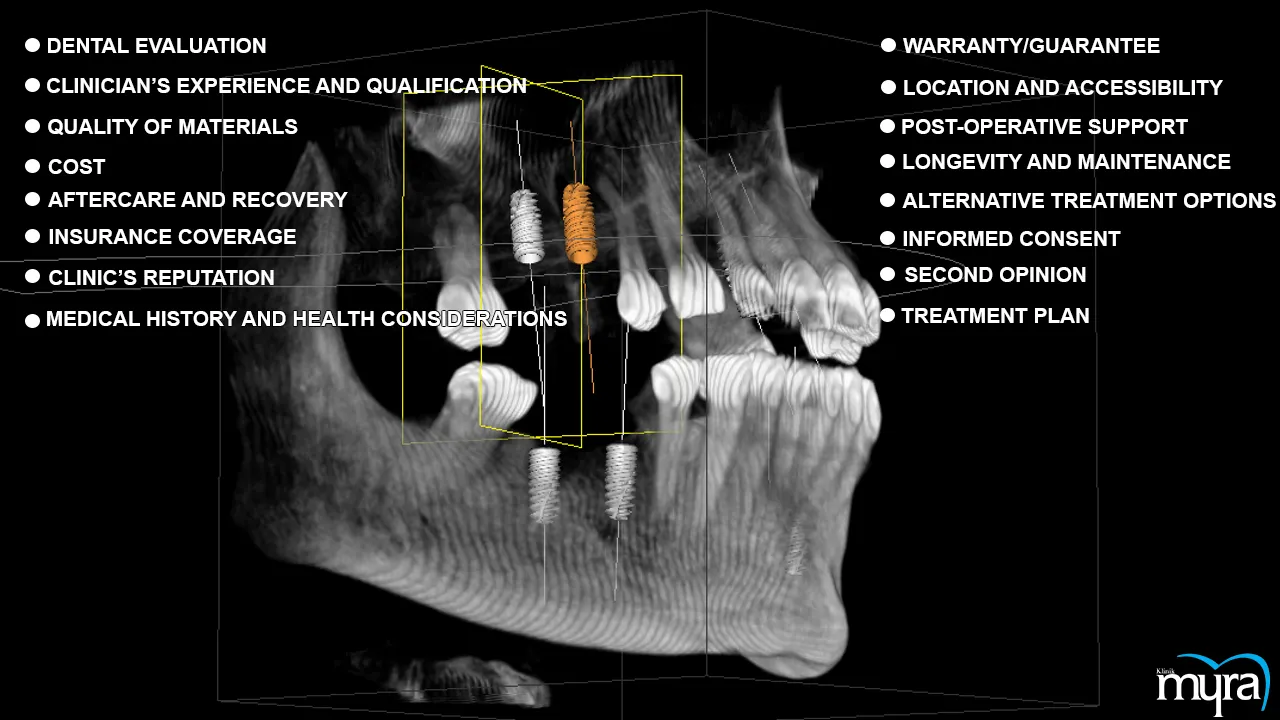
Your key considerations in getting teeth restorations with implants in Turkey should be the following.
- Dental Evaluation: Start with a thorough dental evaluation to determine if one is a good candidate for dental implants and check the general oral health.
- Clinician’s Experience and Qualification: Pick an implantologist or dental surgeon with a successful track record of implant surgery.
- Quality of Materials: Ensure the clinic uses high-quality implant materials that adhere to the most stringent safety and durability criteria.
- Cost: Consider the total price of the treatment, which includes the cost of the implant surgery, the restoration, and any supplementary costs such as travel and lodging.
- Aftercare and Recovery: Inquire about the post-operative care and recovery procedure, including follow-up appointments and any issues.
- Insurance Coverage: Confirm any financial details and determine whether one’s dental insurance covers any portion of the implant treatment.
- Clinic’s Reputation: Read reviews and testimonials from previous clients to learn more about the dental clinic’s or implant centre’s reputation.
- Warranty/Guarantee: Inquire about the warranty or guarantee offered on the implant and restoration to ensure patients have recourse in case of a problem.
- Location and Accessibility: Consider the location and accessibility of the clinic and its proximity to the lodgings.
- Post-Operative Support: Understand the level of support and direction provided during the recovery phase, including oral hygiene and diet instructions.
- Longevity and Maintenance: Talk about the estimated implant lifespan and the upkeep needed to keep it that way.
- Alternative Treatment Options: Find out if there are any other treatments that are better for one’s health needs.
- Medical History and Health Considerations: Communicate one’s medical history and any relevant health considerations to the clinician to evaluate risks or contraindications.
- Informed Consent: Make sure one fully understands the process, risks, and benefits, and give informed consent before moving forward.
- Second Opinion: Consider getting a second opinion from a specialist or dentist who is similarly qualified to confirm the recommended course of action.
- Treatment Plan: Dental implants are a long-term commitment that necessitates careful consideration of the planned treatment plan, including the schedule, procedures, and desired outcomes.
1. Dental Evaluation
A dental evaluation is a thorough examination of a patient's general oral health done by a dentist. The goal of the dental evaluation is to ascertain the state of the teeth, gums, and other oral structures by a variety of tests and diagnostic techniques. A dental evaluation is an important first step in the dental care process since it helps the dentist diagnose dental problems, plan the best treatments, and set the stage for continuous oral health maintenance.
A dental evaluation serves as the basis for all choices about dental care. First, a dental evaluation enables the dentist to recognise and treat any current dental issues, including cavities, gum disease, or infections of the mouth. Early identification is the key to stopping these problems from developing into more serious and expensive illnesses. A dental evaluation is essential to determining whether a patient is a good candidate for other dental procedures, such as restorative care like dental implants or cosmetic care like tooth whitening.
The dentist must gain the knowledge required to create a personalised treatment plan that attends to the patient's particular wants and concerns without completing an evaluation. Regular dental evaluations act as a preventive measure because they identify problems in the earliest stages, thereby sparing patients from needing extensive dental work in the future. A dental examination is essential for maintaining good oral health and making sure that the right dental care is given.
2. Clinician’s Experience and Qualification

The clinician’s experience and qualification refer to the professional background, training, and expertise of the dental specialist responsible for performing the dental implant procedure. The clinician’s experience and qualification include their training, years of experience, implantology expertise, and a history of successfully placed implants.
The clinician’s experience and qualifications are essential in the dental implant process since they have a substantial impact on the procedure’s success, safety, and ultimate outcome. A skilled implantologist with experience and good qualifications accurately diagnoses the patient’s particular dental condition, arranges the procedure well, and carries it out precisely. They foresee and control future issues, ensuring a quick and effective recovery.
The clinician’s knowledge helps choose the best implant type and placement for the patient’s particular requirements, ultimately resulting in a durable and natural-looking tooth repair. Inexperienced or improperly trained practitioners increase the risk of complications, implant failure, or inferior results. The key to a successful and stress-free dental implant journey is through selecting a highly skilled and experienced clinician.
3. Quality of Materials
The quality of materials utilised in any dental procedure is essential, especially in the context of restorative dentistry. Choosing and using dental materials that adhere to strict safety, durability, and biocompatibility requirements is essential to the procedure. The significance of the process must be emphasised, as the materials used have a direct impact on the longevity, functionality, and aesthetics of the dental restoration.
There are numerous benefits to employing high-quality materials in dental operations, such as crowns, bridges, and dental implants. The quality of materials makes a significant contribution to the restoration's long-term success. The dental work resists the rigours of daily use, such as chewing and speaking, due to durable and biocompatible materials. Using high-quality materials helps preserve the restoration's beauty over time by avoiding problems, including degradation or yellowing.
The patient's overall health depends on the usage of safe and biocompatible materials. Inappropriate or low-quality materials cause allergic reactions, unpleasant reactions, or difficulties in the oral cavity. The danger of such consequences is decreased, and patient safety is guaranteed by ensuring materials adhere to established safety standards.
The quality of the materials has a significant impact on the aesthetics of dental restorations. The use of the proper materials improves the cosmetic aspect of the restoration, ensuring that it blends nicely with the patient's natural teeth, whether it's a natural-looking crown or a seamlessly integrated dental implant.
4. Cost
Cost is the investment or financial outlay necessary to get a good, a service, or to carry out an action. Cost includes various elements, including financial outlays, time commitments, resource usage, and even lost opportunities. Cost is the monetary amount that a patient must budget for the full treatment, including surgical and restorative components and any related costs such as travel and lodging in the context of healthcare and dental procedures such as teeth restorations with implants in Turkey.
Cost analysis is a crucial stage in any significant decision-making process, but it is particularly essential when it comes to medical procedures such as dental implant restorations. Cost is important because the financial aspects of a treatment plan directly impact a patient's capacity to access and pay for necessary care. Cost considerations affect the type of dental care chosen, the amount of dental work done, and even the choice to seek treatment in a particular country, including Turkey, where dental procedures are less expensive without sacrificing quality.
The relevance of cost consideration extends beyond the immediate financial repercussions. Cost is essential in determining whether a treatment plan is feasible and how much money is required over the long term. Patients must consider the overall value they obtain for their investment and the initial expense of dental implants. It entails assessing the calibre of the materials used, the level of dental team experience, and the expected longevity of the dental implant. Cost considerations entail looking into insurance coverage, financing choices, and any discounts or subsidies that are offered.
Understanding the cost is even more essential when considering dental care overseas, such as in Turkey. The cost enables patients to budget for travel expenses, lodging, and any unforeseen circumstances that happen while they are there. Individuals access the dental treatment they require while carefully managing their financial resources if cost-related decisions are made.
5. Aftercare and Recovery
Aftercare and recovery in the context of dental implants relate to the critical period following the surgical implantation of the implant and the subsequent attachment of the prosthetic tooth or restoration. Aftercare and recovery include a variety of procedures and safety measures to guarantee the success and long-term stability of the dental implant and the patient's comfort and well-being.
Aftercare and recovery are essential to the implant's overall success and the patient's contentment with the results. The surgical site heals during the phase, and the implant combines with the surrounding bone through a process known as osseointegration. The proper aftercare speeds up the healing process and lowers the risk of complications such as infection or implant failure.
Patients must carefully follow the advice their dental care team gave at the time, which includes maintaining good oral hygiene, abiding by food restrictions, attending follow-up appointments, and staying away from activities that impede the healing process. People who neglect aftercare result in issues that need additional procedures and jeopardise the implant's durability and efficacy. A successful and long-lasting dental implant treatment depends on careful aftercare and recovery.
6. Insurance Coverage
Insurance coverage refers to the amount to which an individual's or a group's medical expenses are paid by their insurance provider. Insurance companies give financial protection and assistance in the event of medical treatments, procedures, or healthcare-related charges.
Insurance coverage acts as a safety net that provides monetary stability and mental comfort in the event of illness, accidents, or medical operations, including dental work such as implant-supported tooth restoration. Inadequate insurance coverage leaves people with significant out-of-pocket costs, which puts them in a difficult financial situation.
Insurance coverage greatly lessens the financial burden connected with dental implants, which is an expensive treatment. Insurance coverage promotes routine dental examinations and preventive care, which eventually improves general oral health and well-being. It is essential for people to carefully analyse their insurance contracts, comprehend the scope of dental implant coverage, and make wise judgements about their oral health and financial planning.
7. Clinic’s Reputation
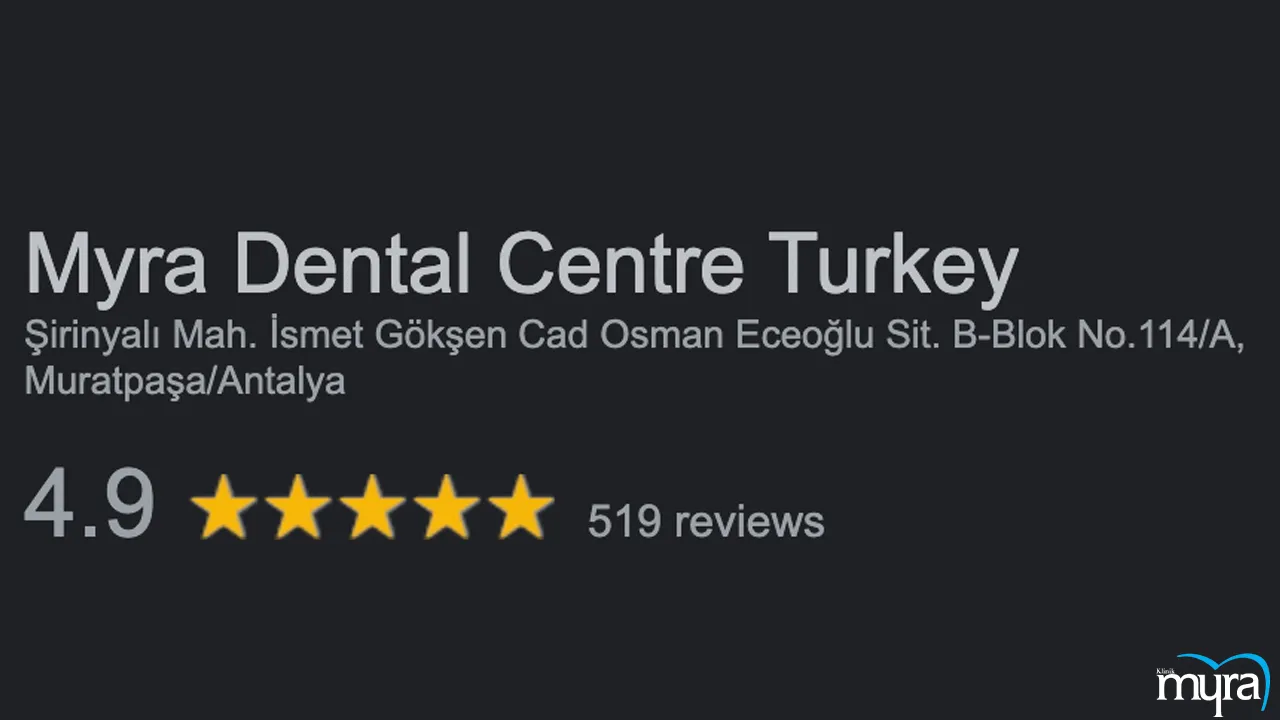
The reputation of a dental clinic plays a pivotal role in the decision-making process when contemplating teeth restorations with implants in Turkey. The clinic's reputation relates to how the dental clinic is viewed and how well-respected it is by its clients and the wider dentistry community.
The reputation of a clinic is a great indicator of the calibre of care it offers. The clinic's reputation speaks to the clinic's professionalism, knowledge, and degree of patient satisfaction. Skilled dental practitioners with experience in implant treatments prefer to work at a clinic with a good reputation. It represents a dedication to moral behaviour and patient-centred care. Choosing a respected clinic gives patients confidence, ensuring them that they are in capable hands, which is especially important when having a complex operation such as dental implantation.
Researching the reputation of the clinic is essential while seeking dental implant therapy. Researching includes reading patient evaluations and testimonies, looking for reviews and ratings online, and getting referrals from friends, relatives, or other medical experts. Positive patient experiences and effective outcomes are frequently linked to a clinic's reputation. A reputable clinic is more likely to have a history of upholding strict safety and sanitary standards, which are essential in any surgical treatment. It is important to evaluate a clinic's reputation to ensure the quality of service and add to patient comfort and the process' overall success.
8. Warranty/Guarantee
A warranty or guarantee is a commitment made by the dental clinic or implantologist to stand behind the quality and durability of the dental implant and associated restoration work. A warranty or guarantee often specifies the precise terms and circumstances under which the clinic provides repair, replacement, or any necessary revisions if problems with the implant or restoration occur within a predetermined time period following the treatment.
The warranty or guarantee provided by a dental clinic is an essential part of the dental implant process. The warranty or guarantee demonstrates the clinic's faith in the equipment utilised, the surgical skill of the staff, and the general calibre of the care given. It gives the patient peace of mind because they know they have options without paying additional fees in case of any complications or implant issues. The phase is essential because it forges a relationship of openness and trust between the patient and the dental professional. It strengthens the latter's dedication to the former's long-term oral health.
A warranty or guarantee acts as a type of protection from unanticipated events. The clinic is normally responsible for resolving and correcting any difficulties that arise with the implant or restoration during the allotted warranty term, including structural problems, breakage, or flaws. It is done at no extra cost to the patient. Resolving the clinic's mistake alleviates financial concerns and highlights the clinic's commitment to patient satisfaction and the longevity of its work.
The warranty or guarantee motivates dental offices to uphold high standards for their practices and supplies. Clinics are motivated to utilise top-quality implant components and make sure that their surgical skills are of the greatest calibre since they are aware that they are held accountable for any flaws. The warranty or guarantee is essential in the decision-making process when choosing dental implants for tooth repair since it gives patients confidence in the durability and dependability of their implants.
9. Location and Accessibility

Location and accessibility refer to a medical facility's physical location and how simple it is for patients to get there. Location and accessibility are essential in the field of dental care because they guarantee that patients get prompt and practical care. The clinic's location includes its physical location and how easily it is reached, how close it is to a patient's place of residence or lodging, and what transit alternatives are accessible. Accessibility considers things such as parking options, accessibility to public transportation, and any concessions made for people with mobility issues.
Location and accessibility directly affect a patient's overall satisfaction, treatment compliance, and even the outcome of the dental surgery. First, a conveniently placed clinic lessens stress and travel time, increasing the rate at which patients keep appointments and complete their treatment regimens. The location and accessibility guarantee that patients quickly get to the clinic for prompt care in case of emergency or unanticipated difficulties. Accessible facilities encourage inclusion by facilitating access to care for people of all abilities, whether through parking options or adjacent public transportation. A well-located and accessible dental clinic enhances the patient experience and supports better outcomes and overall satisfaction with dental treatment.
10. Post-Operative Support
Post-operative support in dental implant surgery refers to the comprehensive care and guidance provided to patients after the surgical procedure has been completed. Post-operative support includes various services, including follow-up visits, advice on food and oral hygiene, monitoring for problems, and addressing any worries or inquiries the patients have during the healing process.
Post-operative support is essential for various reasons. First, post-operative support is essential for the success of the implant process. Proper post-operative support reduces the risk of complications such as infection or implant failure, which has long-term repercussions. Second, post-operative support aids in the patient's comfort and well-being during the healing process by assisting them in efficiently managing pain and suffering. Post-operative support ensures that the patient knows how to keep their mouth clean around the implant, promoting its long-term stability and health. The patient's journey to obtaining a dental repair that is functional and aesthetically acceptable includes post-operative support.
Patients often receive thorough instructions on how to take care of their implants and oral health during the post-operative period. The instructions include advice on how to brush and floss properly and suggestions for a soft diet during the initial healing stage. Regular check-ups with the dental staff enable the evaluation of healing progress and the early identification of any problems. Post-operative support allows patients to express any worries or discomfort they are having, guaranteeing quick care if necessary.
Post-operative support includes instruction regarding prospective lifestyle changes. Patients are urged to give up bad habits such as smoking, which delay recovery and reduce the implant's lifetime. Stressing the significance of such dietary and lifestyle modifications encourages patients to participate in their dental health actively.
11. Longevity and Maintenance
Longevity and maintenance in dental implants refer to the anticipated lifespan of the implant and the ongoing care required to ensure its continued functionality and appearance. Longevity and maintenance are essential in helping people who are thinking about getting dental implants make a choice.
The longevity and maintenance of dental implants are crucial factors as they directly impact the success and value of the implant investment. Dental implants are intended to be a long-term remedy for missing teeth, which last a lifetime if properly cared for. Patients better appreciate the longevity and maintenance of implants compared to alternative tooth replacement choices by being aware of them. It emphasises how vital post-implant care is because skipping maintenance results in problems or implant failure.
Dental implants need a significant financial and emotional investment, making longevity and maintenance essential. Patients who receive dental implants do so with the intent of finding a reliable and long-lasting replacement for their missing teeth. Implants last a lifetime, which gives one comfort and certainty.
The longevity is dependent on careful maintenance. Patients must be dedicated to maintaining great oral hygiene routines, which include frequent brushing, flossing, and dental examinations. People who don't practise good dental hygiene develop conditions such as gum disease or peri-implantitis, which endanger the durability of the implant. Patients must play a part in preserving their implants.
The necessity of regular follow-up visits with the implantologist or dentist is highlighted by understanding the significance of maintenance. These examinations enable medical specialists to evaluate the implant's condition, make the required corrections, and quickly deal with new difficulties.
12. Alternative Treatment Options
Alternative treatment options in the context of dental implants relate to the different alternatives to implant-based tooth restoration that a patient considers. Alternative treatment options include dental bridges, removable dentures, or other prosthetic appliances, each of which has advantages and drawbacks of its own. Exploring alternative treatment options involves a thorough evaluation of the patient's dental condition, requirements, preferences, and overall health to determine the most appropriate and individualised method for replacing missing teeth.
Choosing alternative treatment options is essential in ensuring that the selected course of therapy fits the patient's particular needs. Patients and physicians jointly decide on an option by weighing the benefits and adverse effects, considering the patient's dental health, spending power, way of life, and treatment objectives. Choosing alternative treatment options offers an essential opportunity to analyse the advantages and disadvantages of various treatment techniques, establishing reasonable expectations and raising patient satisfaction.
Exploring alternative treatment options is essential for a number of reasons. First, exploring alternative treatment options enables patients to make an informed decision that meets their individual needs. Dental implants are frequently a great option, but not everyone benefits from them owing to things such as oral health, bone density, or budgetary limitations. Second, exploring alternative treatment options encourages a patient-centred approach to healthcare in which the patient and the doctor have an open discussion to determine the best course of action jointly. Third, it helps patients comprehend the long-term upkeep requirements linked to each alternative and leads to more economical solutions. Evaluating alternatives encourages individuals to actively participate in their dental treatment, leading to a more successful and satisfying teeth repair experience.
13. Medical History and Health Considerations
Medical history and health considerations are essential components of the dental implant procedure. Checking the medical history and health considerations entails a thorough examination of the patient's medical history, which includes any underlying medical issues, prescription drugs, food allergies, and lifestyle choices that affect the outcome of the implant operation. It is a crucial component of dental implant planning and care, ensuring the patient's safety and the implants' long-term success.
Medical history and health considerations serve as the foundation for safe and effective treatment. Dental professionals must be informed of any medical issues that limit a patient's ability to undergo surgery or impact the recovery time. Certain medical conditions, such as diabetes or heart disease, increase the risk of complications during and following implant surgery. The patient's reaction to anaesthesia and bleeding during surgery is affected by medications, particularly blood thinners. Smoking and other lifestyle choices have an impact on treatment choices and results. The dental professionals modify the treatment plan, foresee any difficulties, and take essential security measures by carefully evaluating the patient's medical history to guarantee a successful and secure implant operation. It's a proactive approach that helps to reduce risks and increases the rate at which the patient has a successful outcome.
14. Informed Consent
Informed consent is an essential phase in the medical and dentistry fields in which a patient is given thorough information about a proposed medical or dental procedure, including its purpose, risks, advantages, available alternatives, and any complications. The patient is given the opportunity to ask questions before freely consenting to the surgery after fully knowing what is coming up.
Informed consent is a basic ethical and legal premise that protects a patient's autonomy and right to make healthcare decisions for themselves. Informed consent enables patients to choose their own treatments by arming them with comprehensive knowledge. Informed consent protects the patient's rights while establishing a trusting and respectful doctor-patient relationship. Informed consent protects healthcare professionals from liability by ensuring that the risks and benefits of a procedure have been appropriately conveyed, lowering the risk of disagreements or legal complications. Informed consent is fundamental to patient-centred care, moral dentistry and medical practice.
Informed consent is a complicated process that requires open and honest communication between the healthcare professional and the patient. The clinician starts by outlining the proposed procedure's goal and advantages in plain, intelligible terms. The patient is advised about any risks and complications that occur before, during, or after the surgery. The healthcare provider must review any alternative therapies offered, along with their advantages and disadvantages.
Informed consent is essential because it ensures the patient has all the information needed to choose their dental treatment in an informed manner. Informed consent enables patients to compare the risks and benefits of several solutions and determine which one best suits their needs and preferences. Informed consent emphasises healthcare transparency and builds confidence between the patient and the healthcare professional.
Written consent forms are frequently used in addition to verbal communication to record the patient's comprehension and acceptance. The patient must willingly sign the written consent or, if appropriate, their legal representative because they serve as documentation of the informed consent procedure. Informed consent emphasises the value of respecting human autonomy and ensuring that patients actively participate in their healthcare decisions. It is a cornerstone of ethical healthcare.
15. Second Opinion
A second opinion in the context of medical or dental treatment refers to seeking the input and evaluation of another qualified healthcare professional before making a final decision about a recommended treatment plan. A second opinion entails speaking with a separate medical professional to get a second opinion on their ailment, diagnosis, and recommended course of action. A second opinion is essential when making complex or important medical decisions, such as situations involving major surgeries, long-term diseases, or dental procedures like dental implants.
Seeking a second opinion is an important stage in the healthcare decision-making process for various reasons. First, seeking a second opinion gives patients more knowledge and viewpoints to help them better comprehend their disease and the available options for therapy. Patients are given more control over their decisions and are given the information they need to make well-informed decisions. Second, seeking a second opinion reveals additional treatment modalities, resulting in more conservative or minimally invasive choices that are equally beneficial. Third, it assists in spotting errors or misdiagnoses, ensuring that the right course of action is taken. Fourth, seeking a second opinion fosters a collaborative and informed approach between patients and healthcare professionals, which improves patient-centred care, lowers the risk of pointless operations or treatments, and adds to overall better healthcare results.
16. Treatment Plan
A treatment plan is a detailed document that defines the recommended course of action for diagnosing, managing, and treating a patient's specific ailment or health issue in the context of healthcare, particularly in dentistry and medicine. A treatment plan acts as a road map for patients and healthcare professionals, outlining the actions, practises, treatments, and interventions needed to reach the intended health outcomes. Treatment plans are customised for each patient and are essential for delivering successful, well-coordinated care.
Developing and implementing a treatment plan are paramount in healthcare for several reasons. First, a treatment plan offers a methodical and planned way to manage a patient's health issues, making sure that all crucial facets of their care are considered. A treatment plan improves the standard of care and lessens the risk of missing important details. Second, a well-designed treatment plan encourages good communication and teamwork among medical professionals, ensuring everyone in the care team is on the same page. Third, a treatment plan gives patients more control over their care by including them in the decision-making process and educating them about their disease, available treatments, and expected results. Fourth, a treatment plan is crucial to maximising patient outcomes, encouraging patient contentment, and getting the best outcomes in terms of health. It is a useful tool for tracking development and making required modifications as treatment progresses.
What is a Dental Implant?
A dental implant is a surgical component composed of titanium that is put into the jawbone to replace a missing tooth or teeth. A dental implant functions as an artificial root, offering a solid base on which a crown, bridge, or denture is firmly fastened. The implant combines with the surrounding bone tissue through a process known as osseointegration, resulting in a strong and durable tooth repair that closely resembles the appearance and function of the native tooth. A Dental Treatment Implant is a popular and reliable tooth replacement option that provides long-term durability and a smile that looks natural.
What are the Different Types of Dental Implants?
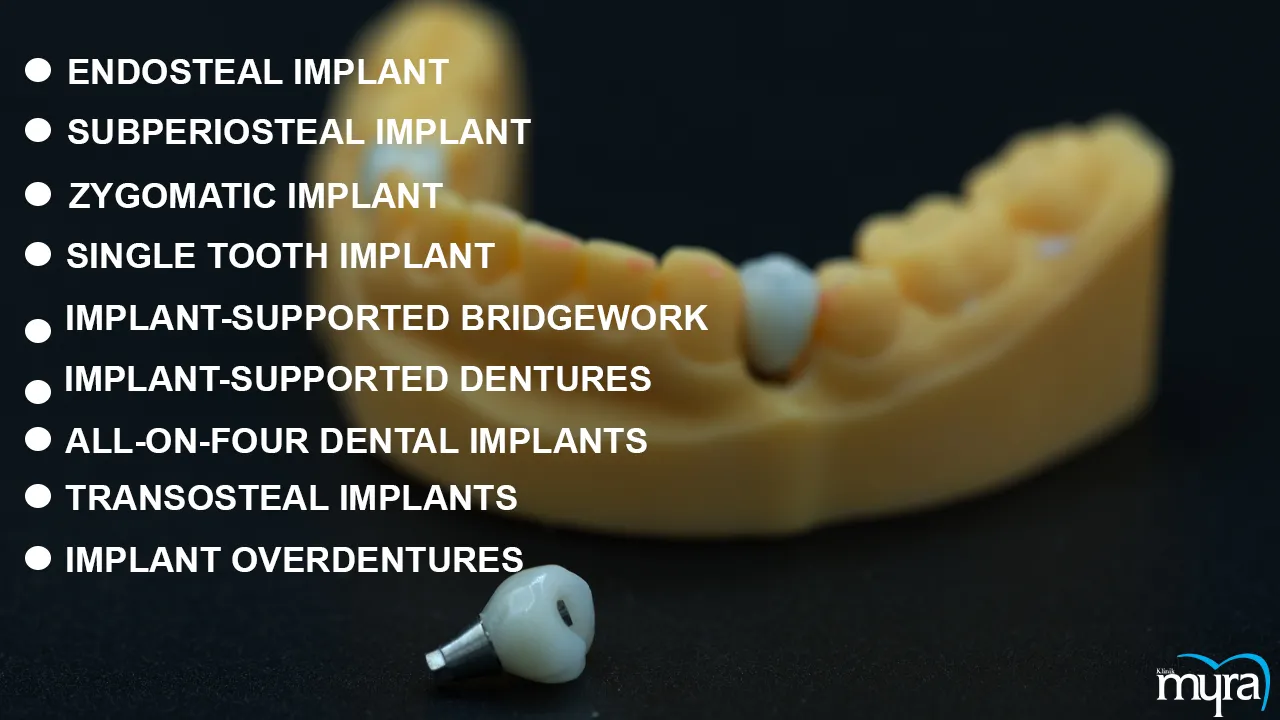
The different types of dental implants are listed below.
- Endosteal Implant: Endosteal implant is the most frequent type of dental implant, and it consists of a titanium post that is surgically implanted directly into the jawbone. The endosteal implant provides a secure base for solitary crowns, bridges, or dentures.
- Subperiosteal Implant: Subperiosteal implants are positioned beneath the gum line but above the jawbone when there is insufficient bone height for conventional implants. They support dental prostheses and are manufactured specifically to fit the patient's bone structure.
- Zygomatic Implant: Zygomatic implants are longer than regular implants and are attached to the cheekbone, not the jawbone. They are frequently used when the upper jaw has suffered significant bone loss.
- Single Tooth Implant: A single tooth implant is one of the 9 Different Types of Dental Implants. Single-tooth implants are used to replace a single lost tooth, as the name implies. It entails inserting a crown and a single implant.
- Implant-Supported Bridgework: Implant-supported bridges are performed when numerous adjacent teeth are lost. The implants support the bridge that fills the space left by missing teeth.
- Implant-Supported Dentures: Implant-Supported Dentures are dentures that are attached to dental implants for increased stability and support. They offer an improved level of comfort and security over conventional detachable dentures.
- All-On-Four Dental Implants: All-On-Four implants are intended for individuals who have lost most or all of their teeth. An entire arch of teeth is supported by four well-positioned implants, offering a fixed and useful repair.
- Transosteal Implants: Transosteal implants, commonly called mandibular staple implants, are used less commonly. They entail screwing a metal plate or frame through the chin into the jawbone, and they are often used when other implant kinds are unsuitable.
- Implant Overdentures: Implant overdentures combine the benefits of dental implants with removable dentures. They are attached to the implants but are removable for cleaning and maintenance.
How to Choose the Best Dental Clinic for Teeth Restoration in Turkey?
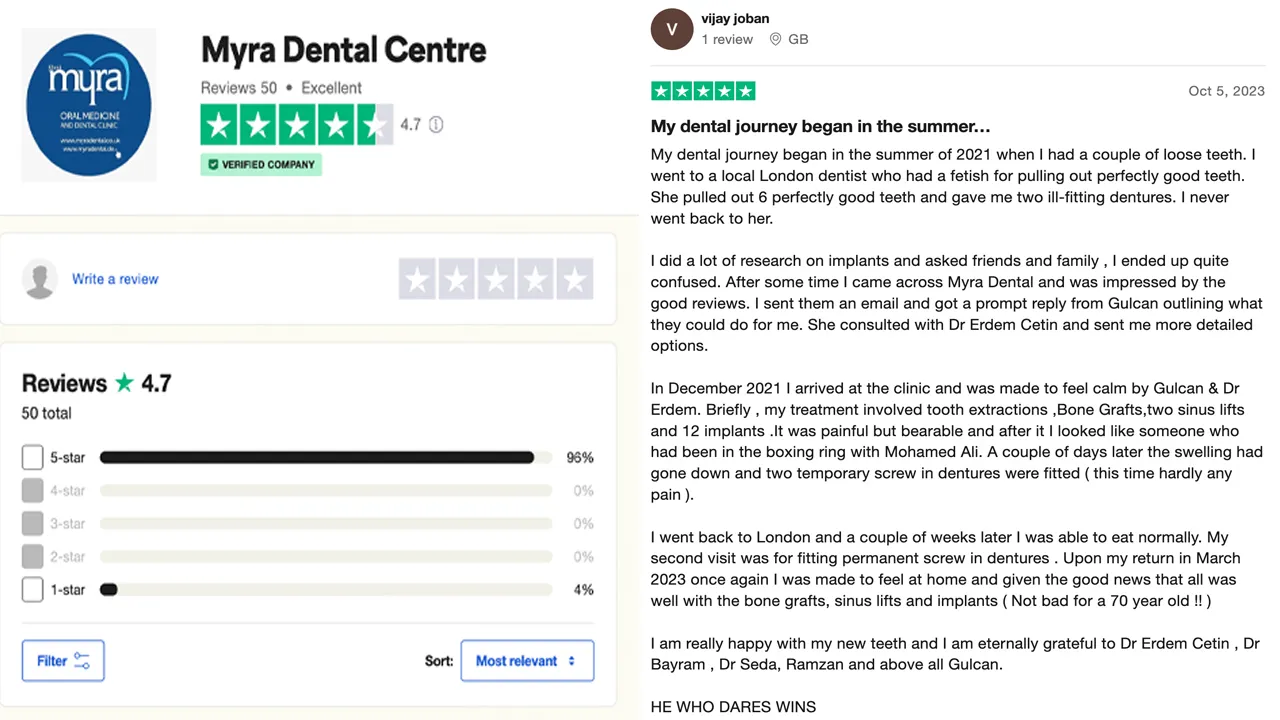
To choose the best dental clinic for teeth restoration in Turkey, people must conduct thorough research and consider several crucial factors. First, seek out dental practices with a good standing and a history of effective teeth restoration techniques. Patient feedback, testimonials, and recommendations provide useful information about the clinic's quality of care. Verify the training and experience of the dentists employed at the clinic to ensure they are qualified to do the precise restoration operations one needs.
People must evaluate the clinic's utilisation of technology and materials of a high calibre. Premium materials and cutting-edge technology substantially influence the effectiveness and durability of dental restorations. Examining the clinic's compliance with international dental standards and hygiene guidelines is essential because it guarantees a sterile and secure patient treatment setting.
People must consider the price of dental restoration procedures, which is frequently less expensive in Turkey than in many Western nations. Patients must be cautious of costs that are too low since they are often a sign of poor quality products or incompetent staff. Talk to the clinic openly about the treatment plan and costs before making any choices to avoid paying for things one didn't expect.
People must inquire about post-operative care and assistance and whether the dental restorations come with a warranty or guarantee. The success of one's therapy is greatly impacted by having access to thorough aftercare.
People must consider the clinic's location, accessibility, and proximity to their lodging. Travel logistics are convenient to offer a smooth experience during their dental restoration journey in Turkey.
What is the Best Dental Clinic in Turkey for Dental Implant?
The best dental clinic in Turkey for dental implants is the Myra Dental Centre Turkey. The Myra Dental Centre Turkey stands out for several compelling reasons. First, Myra Dental Centre Turkey has a fantastic reputation for providing superior dental implant operations, supported by a group of implantologists with extensive training and experience. The clinic's personnel are renowned for their commitment to delivering first-rate patient care and assuring positive results.
Myra Dental Centre Turkey uses cutting-edge equipment and abides by rigid international dental standards to guarantee that patients receive the best quality care. Dental implant restorations are more durable and last longer due to the clinic's dedication to employing high-quality implant materials.
Another important consideration is cost-effectiveness. Myra Dental Centre Turkey offers dental implant treatments at cheap prices while retaining great quality, making it a desirable choice for international customers looking for cost-effective yet high-quality dental care.
The Myra Dental Centre Turkey offers thorough post-acute care and support, making sure that patients receive direction and aid throughout their recovery process. Their dedication to post-operative care improves the general patient experience and helps dental implant surgeries be successful in the long run.
Travellers find it easy to reach Myra Dental Centre Turkey due to its prime position in Turkey, where there are several flight options and a variety of lodging options nearby. These factors work together to make Myra Dental Centre Turkey the top dental office in Turkey for dental implant treatments, continuously producing outstanding outcomes and patient satisfaction.
Can You have a Single Dental Implant?
Yes, you can have a single dental implant. A single dental implant is a common and highly effective solution for replacing a single missing tooth. An artificial tooth root made of titanium that is surgically inserted into the jawbone is used in the procedure. A crown is affixed to the implant to complete the repair after osseointegration, a procedure where the implant and bone become one.
A single dental implant has various advantages, including tooth preservation, increased stability, and a natural-looking and functioning replacement for the lost tooth. Single dental implants are an acknowledged and effective treatment option for people looking to restore a single tooth. What is a single tooth implant? A single tooth implant is a dental procedure that replaces a missing tooth with a surgically implanted titanium post and a crown, restoring both function and aesthetics.
How Long does a Dental Implant Last?
A dental implant lasts for 10 to 30 years or even longer. Dental implants are intended to be a long-term tooth replacement option, and factors including the patient's general dental health, oral hygiene routines, lifestyle choices, and the quality of the implant materials utilised all affect how durable they are.
Brushing and flossing are essential for maintaining the health of the implant and the tissues around it. Regular dental exams and expert cleanings allow one to keep track of the status of the implant and take fast corrective action if necessary. Avoiding bad habits such as smoking and drinking too much alcohol prolongs the life of the implant, as these behaviours increase the risk of complications.
Choosing an experienced implantologist and a reputable dental clinic for the implant process is essential. The use of premium materials and accurate surgical procedures significantly influences the effectiveness and longevity of dental implants. Dental implants offer a long-lasting replacement for missing teeth, considerably enhancing the recipient's quality of life when all factors are considered and the patient follows recommended oral hygiene and lifestyle choices.
What are the Advantages of Getting Dental Implants for Teeth Restorations in Turkey?
The advantages of getting dental implants for teeth restoration in Turkey are listed below.
- Cost-Effective: Turkish dental implant operations are frequently more economical than those in many Western nations, making them a desirable choice for foreign patients looking for high-quality yet reasonably priced dental care.
- High Success Rates: Patients feel confident in the calibre of care they receive at Turkish dental clinics because they frequently have a solid track record of performing successful dental implant procedures.
- Tourism Opportunities: Turkey is a great location for dental tourism because patients combine their dental care with the opportunity to discover its rich culture, history, and natural beauty.
- Effective treatment: Clinics in Turkey frequently provide accelerated treatment programmes that shorten the overall length of the treatment process, making dental implant operations there easier to complete in less time.
- Multilingual Staff: Many dental offices in Turkey have multilingual staff members who interact with foreign patients clearly and comfortably.
- Comprehensive Services: Patients discover solutions catered to their unique needs in Turkey due to the country's extensive dental services, which vary from single-tooth implants to full-mouth restorations.
- Supportive Aftercare: Turkish dental offices frequently offer patients thorough post-operative care and support, assuring their well-being as they recover.
- High-Quality Care: Turkey has a well-developed healthcare system with cutting-edge dental clinics that use advanced technology and are staffed by highly qualified dental specialists who follow international standards.
- Experienced Specialists: Expertise and proficiency are ensured by many Turkish dentists and implantologists who have performed numerous dental implant surgeries.
- Travel Convenience: Turkey has numerous international airports and a variety of lodging alternatives to suit various tastes and budgets, making it accessible from many different corners of the world.
What are the Disadvantages of Getting Dental Implants for Teeth Restorations in Turkey?
The disadvantages of getting dental implants for teeth restoration in Turkey are listed below.
- Cost implications: Significant costs are involved, particularly if numerous implants are needed, although dental implant surgeries are less expensive in Turkey than in many Western nations. Patients must consider their budget.
- Potential for Complications: There is always an opportunity for complications, such as infection, implant failure, or nerve damage, which call for additional treatments or interventions. Potential for Complications is true for any surgical surgery.
- Healing Period: The osseointegration phase of dental implant treatments often requires a healing period of many months. The healing period requires repeated patient visits to Turkey and interferes with the patient's schedule.
- Language Barriers: Language issues make communicating with the dental team difficult for overseas patients and affect the clarity of treatment plans and aftercare instructions.
- Travel logistics: Patients must budget and plan for any logistical challenges associated with travelling to Turkey for dental implants, such as visa restrictions, lodging, and transportation.
- Limited Insurance Coverage: Domestic and overseas dental insurance plans do not fully cover dental implant operations, leaving patients with out-of-pocket costs.
- Cultural and Environmental Adjustment: Patients from various cultural backgrounds need time to get used to Turkey's culture and environment, which impacts how well they respond to dental implants.
- Follow-Up Appointments: Patients who live overseas find it difficult to organise follow-up appointments in Turkey for post-operative care and monitoring.
Is a Dental Implant better than a Dental Veneer for Teeth Restoration?
Yes, a dental implant is better for teeth restoration. Dental implants are the best option when a tooth is lost or must be pulled due to injury or decay. A dental implant gives a long-term and sustainable remedy by replacing the missing tooth from the root up. Implants are put into the jawbone surgically, preserving bone, enhancing stability, and restoring natural functionality. They provide superb aesthetics by resembling a natural tooth in appearance.
Dental veneers are primarily a cosmetic treatment for teeth that are healthy but have unsightly flaws. Dental veneers entail covering the front surface of the tooth with thin porcelain or composite resin shells to fix problems such as discolouration, slight misalignment, or chipping. Dental veneers are not used to fix structural issues or replace lost teeth.
What is the Difference between Dental Implants and Dental Dentures?
The difference between dental implants and dental dentures is that dental implants are removable prosthetic devices that sit on top of the gums and are often thought of as a temporary treatment for tooth loss, whereas dental dentures are removable prosthetic devices that sit on top of the gums.
Dental implants are surgically implanted into the jawbone to act as prosthetic tooth roots, providing a permanent and solid foundation for single crowns, bridges, or dentures. Dental implants are renowned for their lifespan, natural functionality, and promotion of bone preservation. What is Dentures? Dental dentures are detachable prosthetics that replace lost teeth by resting on top of the gums. Dental dentures are less expensive than implants, although they are less stable and require adhesive for retention.
The differences between dental implants and dental dentures are listed below.
- Implantation: Dental implants are placed in the jawbone through surgery and act as artificial tooth roots, while dental dentures are artificial teeth replacements that sit on top of the gums and are detachable.
- Duration: Dental implants provide a tooth replacement option that lasts for decades with proper maintenance, while dental dentures are typically viewed as a temporary fix and eventually require replacement or modification.
- Stability: Dental implants offer good stability and do not require adhesives, so one speaks and chews with confidence, while dental dentures are less stable and require adhesives for retention, which damages one's confidence when speaking and eating.
- Bone Health: Dental implants stimulate the jawbone, stopping bone deterioration over time, while dental dentures do not stimulate the jawbone and result in bone resorption, changing the appearance of the face.
- Functionality: Dental implants closely resemble how natural teeth work, giving biting and eating a more authentic feel, while dental dentures do not offer the same functionality as natural teeth, even though they restore the fundamental functions of chewing and speaking.
- Maintenance: Dental implants require routine oral hygiene maintenance equal to natural teeth, yet they are low maintenance, while dental dentures must be removed frequently for cleaning and need to be relined or replaced due to wear and tear.
- Appearance: Implants have a natural-looking appearance that is appealing to the eye, while dental dentures do not look as natural as dental implants, even though they are visually pleasant.

